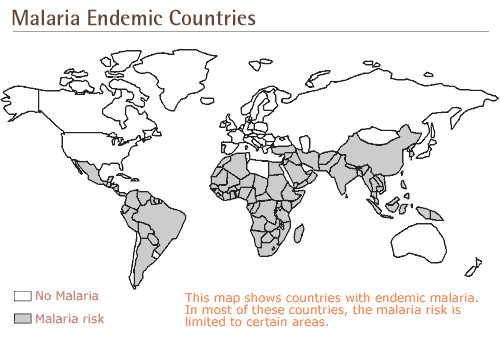Source: DONNA BRYSON, Associated Press via Google, November 10, 2008.
Excerpts:
Researchers trying to create the world's first malaria vaccine are launching a massive medical trial as early as next month involving 16,000 children that could be the largest such trial ever conducted on children in Africa.Comment: I remember Lee Howard telling me a story about the genesis of the malaria vaccine research program. It seems that he was at a meeting of the World Health Organization four or five decades ago, and they were putting all the world's efforts into vertical campaigns to control malaria based on DDT spraying and on case detection and treatment with quinine related drugs.
British-drugmaker GlaxoSmithKline PLC is teaming with the PATH Malaria Vaccine Initiative, which is an anti-malaria charity funded by the Bill & Melinda Gates Foundation, and clinics and research centers in Africa to develop a malaria vaccine.....
The Malaria Vaccine Initiative has so far spent $107 million on the project and has not yet calculated how much more it will spend. GlaxoSmithKline has spent $300 million so far, and estimates it will spend up to $100 million more.
Researchers working on the trial said in an interview in Johannesburg that much of the groundwork already has been laid in preliminary trials involving 4,000 children conducted since 2003.
Returning from the meeting, he and his companion discussed the fallback position if the strategy didn't work, and agreed that there was no adequate fallback. Since Lee at the time was the Director of the Office of Health of USAID, he was in a position to do something about the problem. He started funding malaria vaccine research.
At the time no one had much of an idea of how to make a malaria vaccine. Indeed it was not even possible at the time to produce Plasmodia in vitro in the laboratory, and the development of the needed techniques was one of the first successes of the program.
The development of a vaccine against an organism as complex as the Plasmodium has been much more difficult than the development of vaccines against many viral diseases. The new vaccine may not, and indeed probably will not produce complete protection against infection. Still even partial protection might be very useful.
I suspect that we need a variety of arms against malaria, including mosquito control, bed nets and household insecticide spraying, case finding and treatment, and vaccines.
It would be a great thing to get malaria in tropical countries, where it causes half a billion cases and a million or more deaths a year, down to the levels we see in the United States and Europe. JAD

No comments:
Post a Comment